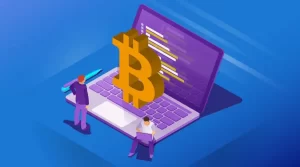Decentralized exchanges (DEXs) are a relatively new type of cryptocurrency exchange that operates on a decentralized blockchain network, allowing users to trade cryptocurrencies in a peer-to-peer fashion. In contrast to centralized exchanges, DEXs operate without a central authority or middleman, making them more secure, transparent, and resistant to censorship. In this article, we will explore the fundamental aspects of decentralized exchanges, including their advantages, challenges, and future potential.
How Decentralized Exchanges Work
Unlike centralized exchanges that rely on a central authority to match buyers and sellers, DEXs use smart contracts to enable peer-to-peer trading. Smart contracts are self-executing computer programs that operate on a decentralized blockchain network, allowing users to execute transactions without the need for a third-party intermediary. When a user submits a trade order on a DEX, the smart contract executes the trade automatically, matching the buyer with a seller and transferring the assets between their respective wallets.
Advantages of Decentralized Exchanges
One of the primary advantages of DEXs is their enhanced security and transparency. Unlike centralized exchanges that are vulnerable to hacks and data breaches, DEXs are distributed across a decentralized blockchain network, making them virtually immune to cyber attacks. Additionally, DEXs operate transparently, allowing users to view the full transaction history of the exchange, enhancing trust and accountability.
Another advantage of DEXs is their resistance to censorship. Traditional centralized exchanges are often subject to government regulations and restrictions, making it difficult for users to trade certain cryptocurrencies or access the exchange from certain locations. In contrast, DEXs are decentralized and operate across a distributed network, making them more resistant to censorship and government interference.
Challenges Facing Decentralized Exchanges
Despite their many advantages, DEXs also face significant challenges that must be addressed in order to ensure their widespread adoption. One of the primary challenges is liquidity. Because DEXs rely on peer-to-peer trading, they often have lower trading volumes and less liquidity than centralized exchanges. This can lead to wider bid-ask spreads and higher transaction fees, making it less attractive for traders to use DEXs.
Another challenge facing DEXs is user experience. Because DEXs operate on a blockchain network, they often require more technical expertise to use than centralized exchanges. This can make it more difficult for novice users to navigate the platform and execute trades. Additionally, the user interface of DEXs can be less intuitive and user-friendly than centralized exchanges, making it more challenging for users to access and use the platform effectively.
Future Potential of Decentralized Exchanges
Despite these challenges, DEXs have enormous potential to transform the cryptocurrency landscape and disrupt the traditional financial system. As the technology behind DEXs continues to improve, we can expect to see increased liquidity, improved user experience, and greater adoption by mainstream users. Additionally, DEXs have the potential to enable new forms of financial innovation, such as decentralized lending and borrowing, creating new opportunities for users to access and use financial services.
Popular Decentralized Exchanges
There are several decentralized exchanges currently operating in the market, each with its own unique features and characteristics. Some of the most popular DEXs include Uniswap, PancakeSwap, SushiSwap, and Curve. Uniswap, for example, operates on the Ethereum blockchain and allows users to trade ERC-20 tokens in a decentralized manner, using an automated market-making (AMM) model. PancakeSwap, on the other hand, operates on the Binance Smart Chain and offers a variety of liquidity pools and yield farming opportunities for users.
Governance of Decentralized Exchanges
Decentralized exchanges are often governed by a decentralized autonomous organization (DAO), which is a type of organization that operates through rules encoded as computer programs on a blockchain. The DAO allows users to participate in the governance of the exchange by voting on proposals and decisions related to the platform. Governance tokens, such as UNI for Uniswap and CAKE for PancakeSwap, allow users to have a say in the direction and development of the exchange.
Regulatory Challenges Facing Decentralized Exchanges
While decentralized exchanges offer many benefits over centralized exchanges, they also face regulatory challenges that must be addressed. In particular, regulators may have concerns over anti-money laundering (AML) and know-your-customer (KYC) compliance, as well as the potential use of DEXs for illicit activities such as money laundering or terrorist financing. Additionally, there may be issues around taxation and reporting requirements, as well as the need for clearer legal definitions and frameworks for decentralized finance.
The Role of Decentralized Exchanges in the Future of Finance
Decentralized exchanges are a key part of the broader decentralized finance (DeFi) movement, which aims to build a more transparent, secure, and accessible financial system. DEXs have the potential to democratize finance by allowing anyone to access and use financial services, without the need for a centralized intermediary. As the DeFi ecosystem continues to grow and mature, we can expect to see a greater role for DEXs in the future of finance.
How Decentralized Exchanges Work
Decentralized exchanges rely on smart contracts to execute trades between buyers and sellers. Smart contracts are self-executing contracts with the terms of the agreement between buyer and seller being directly written into lines of code. When a buyer and seller agree on a trade, they deposit their cryptocurrency into a smart contract, which holds the funds until the trade is completed. Once the trade is executed, the smart contract releases the funds to the respective parties.
Popular Decentralized Exchanges
There are several popular decentralized exchanges currently in operation. Some of the most well-known DEXs include Uniswap, SushiSwap, Curve, and Balancer. These exchanges operate on different protocols and have unique features and benefits for users. For example, Uniswap is known for its simple and user-friendly interface, while Balancer offers customizable liquidity pools for traders.
The Role of Liquidity Providers in Decentralized Exchanges
Liquidity providers (LPs) play a critical role in decentralized exchanges, as they provide the cryptocurrency needed to execute trades. LPs deposit their cryptocurrency into a liquidity pool on a DEX, where it is used to facilitate trades between buyers and sellers. In return, LPs receive a share of the trading fees generated by the DEX. This incentivizes LPs to provide liquidity to the exchange, which in turn increases the overall liquidity and trading volume on the platform.
Conclusion
Decentralized exchanges represent a new paradigm in cryptocurrency trading and finance, offering a more secure, transparent, and accessible alternative to centralized exchanges. While there are challenges and regulatory issues that must be addressed, the potential for DEXs to transform the financial landscape is enormous. By enabling greater financial inclusion, enhancing transparency and security, and democratizing finance, DEXs are at the forefront of the decentralized finance movement, and will play a critical role in shaping the future of finance.















